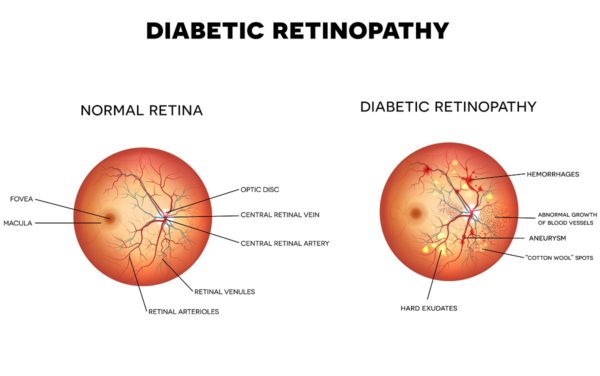The effects of diabetes on many areas of health, including ocular health, are well-documented. Below, the team at Laser Eye Center of Miami discusses four specific ways diabetes can affect vision. We encourage people with diabetes to be very attuned to their eyes and even slight changes in vision, which could indicate a potential problem.
Damages the Retina
One of the most serious ways diabetes affects vision is by damaging the retina, the layer of light-sensitive cells at the back of the eye. Uncontrolled high blood sugar levels and high blood pressure can damage the tiny blood vessels of the retina, causing them to swell and leak fluid or blood. Sometimes the blood flow to the retina is blocked, depriving it of the nourishment it needs. And in some cases of diabetic retinopathy — the blanket term for retinal problems caused by diabetes — new, abnormal blood vessels grow inside the retina, causing complications.
Damages the Macula
The macula is the part of the retina responsible for capturing fine detail. Half of all people with diabetic retinopathy develop macular edema, or a buildup of fluid in the macula. This compromises visual clarity.
Raises the Risk of Glaucoma
According to the American Diabetes Association, people with diabetes have a 40 percent higher risk of glaucoma than non-diabetics. The risk goes up the longer a person has diabetes and the older they are.
As discussed in last month’s blog post, glaucoma is a condition in which elevated levels of intraocular pressure damage the optic nerve, either slowly or suddenly. Cases of open-angle glaucoma develop slowly, and cases of narrow or angle-closure glaucoma come on suddenly.
Raises the Risk of Cataracts
People with diabetes are 60 percent more likely to develop cataracts than people without diabetes, according to the American Diabetes Association. Cataracts are a clouding of the eye’s normally clear lens, and cause blurred or hazy vision, dulled colors and other visual problems.
The good news is that by taking the proper precautions, people with diabetes can reduce their risk of developing these problems and losing vision. People with diabetes are encouraged to have routine eye exams, during which an ophthalmologist takes a close look at the inside of the eye to identify any signs of a problem. If caught early, problems like diabetic retinopathy and glaucoma can be managed with medication and/or laser or conventional surgery.
Contact Laser Eye Center of Miami
If you have been diagnosed with diabetes and want to schedule an eye exam with our team, please contact us today.







